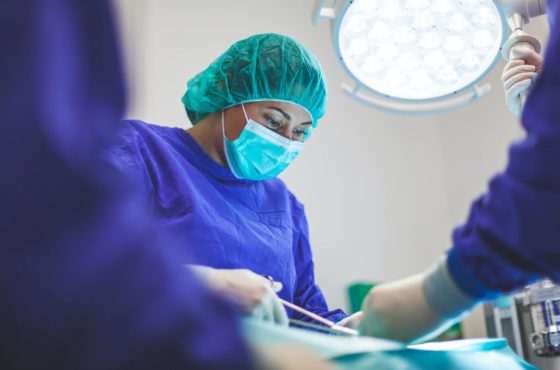Adhesion is a hernia mesh complication caused by potentially defective hernia mesh implants which can result in further injuries.
In fact:
Victims who have filed a hernia mesh lawsuit have often named adhesion as one of the injuries they have suffered from following hernia repair using surgical mesh.
What is Adhesion?
In general, adhesions are bands of scar tissue that result from a disturbance in tissue due to trauma or surgery and may form between two surfaces in the body as part of the healing process.
When formed in patients after hernia repair surgery, an adhesion usually begins in the peritoneum, which is a membrane that lines the abdominal cavity and the outer surface of abdominal organs.
In this case, the scar tissue develops around the mesh implant and bonds the hernia mesh with other internal tissue or organs. However, when adhesions form, organs connected by the scar tissue may grow together and not function normally, causing health problems.
In fact:
A 2016 study looked at 124 patients who had hernia mesh repair. Through an MRI, the researchers found that 20-50% of the patients suffered from mesh shrinkage, which is another potential complication from the use of mesh implants, while 60% experienced ahdesions between the abdominal wall and the bowel.
The study added that most of these patients did not experience any pain, bleeding, or any other symptoms of adhesion, and only 5% reported pain during normal activities while 13% reported having pain during moderate activity.
Surprisingly, complaints about pain were lower in those who experienced adhesions, but no exact reason was given for why this happened.
It is important to note, however, that adhesions can potentially lead to serious bowel obstructions. Therefore, it is important for anyone who had surgery to fix their hernias to never ignore any abdominal symptoms they may be experiencing.
Symptoms of Hernia Mesh Adhesion
In some cases, adhesions are minor, painless, and therefore can go unnoticed. However, the use of a defective hernia mesh device can make adhesions worse and its associated complications.
If you recently had hernia surgery especially in the abdominal area, then the following may be signs of adhesion:
- swelling in the abdominal region
- chronic pain in abdomen or pelvic area
- cramping
- bloating
- fever of unknown reason
- severe abdominal pain
- inability to pass gas
- vomiting
An adhesion can occur in any part of the body, but it is most common in areas including the abdomen, pelvis, and heart.
Adhesions are actually pretty common following tissue disturbance from surgery, and most also do not cause complications. However, in the rare chance that they do, it can be painful and can come with catastrophic complications.
If you experience any of the symptoms listed above after your hernia surgery, seek immediate medical attention.
Complications Associated with Hernia Mesh Adhesions
Ahdesions can begin forming a few days or weeks following hernia repair surgery. In some cases, however, adhesions can form over the course of a few months or years after tissue disturbance.
There are a number of complications which may result from adhesion following hernia repair, including:
- bowel obstruction
- chronic abdominal and pelvic pain
- infertility
- digestive problems
- difficulty urinating
- tissue death
How Is a Mesh Adhesion Diagnosed?
To this day, there are no x-rays or other imaging techniques that can be used to diagnose the presence of an adhesion. Typically, surgery is needed to diagnose and afterwards treat abdominal adhesions.
However, as with other procedures, a new surgery comes with a set of risks and since the medical procedure involves another traumatic damage to the abdominal wall, it can potentially cause more adhesions.
In fact:
Adhesions which are treated via a surgical procedure has an increased risk of returning. This can potentially happen when a band is separated or cut and the two ends may adhere to other tissue or organs.
Unfortunately, the supposed solution can potentially end up causing more problems.
Treatment for Adhesions
Adhesions are typically treated via surgery. Some common surgical techniques include laparoscopy and laparotomy.
Laparoscopic surgery is said to decrease the risk of abdominal adhesions because a number of small incisions are made in the body instead of one large incision. In this procedure, the surgeon uses a small camera and inserts it through one of the small incisions.
This camera is used to identify an adhesion and if it is indeed present in the abdominal area, the adhesion will be cut and released by the surgeon.
On the other hand, laparotomy involves making a larger abdominal incision in instances where laparoscopic surgery is not possible. this procedure is performed to examine the abdominal organs and see if there is an adhesion.
Once identified, the problem can be fixed through laparotomy.
Other Hernia Mesh Complications
Aside from mesh adhesions, complications from the use of surgical mesh also include pain and discomfort, bowel obstruction, bowel perforation, hernia recurrence, infection, mesh shrinkage, device migration, and rejection.
After a hernia mesh repair, patients have complained about a wide array of side effects, with severe pain being the most frequent complaint, as well as recurrent hernias.
The most serious complications following a hernia mesh surgery are also some of the most common ones.
According to the FDA, some of the most common hernia mesh complications include:
- bowel perforation
- adhesion
- mesh infection
- rejection
- bowel obstruction
- mesh migration
- chronic pain and discomfort
- hernia recurrence
Aside from causing severe pain and being potentially fatal, most of these complications also require revision surgery to correct.
Did You Suffer from Adhesion Because of a Defective Mesh Implant?
No patient should have to go through a number of complications due to a defective medical device. However, at times, no matter how careful we are, bad things may still happen.
In the United States, dealing with mesh complications almost always mean additional medical bills due to additional medical procedures which are necessary to correct or repair the damage caused by the device, which shouldn’t really have happened in the first place.
But that’s where we come in — we are here to provide you with the legal blueprint or assist you with the next legal steps you might want to take if you or a loved one suffered from adhesion or other mesh-related complications after having hernia repair surgery.
Most importantly, it is important to know that you are not alone. Several victims of defective mesh devices have chosen to file a hernia mesh lawsuit not only to hold abusive medical device manufacturers accountable, but also to prevent other patients from potentially suffering the same fate.





